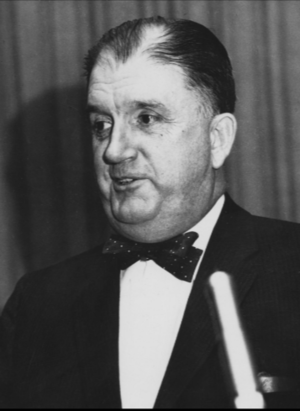Charles Marshall
( academic) | ||||||||||||||
|---|---|---|---|---|---|---|---|---|---|---|---|---|---|---|
 | ||||||||||||||
| Born | March 25, 1908 Catskill, New York | |||||||||||||
| Nationality | US | |||||||||||||
| Alma mater | • Texas College of Mines and Metallurgy • University of Texas • Harvard | |||||||||||||
| Member of | Committee on the Present Danger | |||||||||||||
| Interests | ||||||||||||||
William Elliott protegé who became member of policy planning staff at the State Department. Wrote a paper entitled The Berlin Crisis for the 1959 Bilderberg
| ||||||||||||||
Dr. Charles Burton Marshall wrote a paper entitled The Berlin Crisis for the 1959 Bilderberg.[1]
Contents
Education
After attending the El Paso High School, he did three years at Texas College of Mines and Metallurgy, but not studying mining. He worked ith newspapers in, El Paso and Austin, Texas, 1925-1931.[2] He finished college at the University of Texas. Because of the Depression it was impossible to find a job of any sort in the newspaper business, so he stayed on and did graduate work at the University of Texas and worked for professor Charles Timm.
He was a graduate student at Harvard from 1934 to 1936. He returned to Harvard as an instructor and wrote his Ph.D. thesis from 1938 until 1942. One professor that had very great influence on him was William Elliott, even though Marshall never had a course from him.
He later said "Bill Elliot was a true friend and took a very great interest in me and in helping me along. Bill Elliot was the greatest influence, but not from the standpoint of classwork."[3]
World War 2
When Marshall signed up during World War 2, professor Elliot "fixed up some appointments for me in Washington when I got in touch with him. I went down to Washington, and I talked to people, and here was Brigadier General Wylie, who was Director of Operations in Army Transportation. He received me and talked to me about two hours, and he cordially invited me into the Army. I said, "Well, where will I be serving?" He said, "At this next desk; I want you for my executive officer." So I thought if I could go into the Army as Executive Officer to a man who had a general's grade and so on, that would beat lounging around in the replacement depot. So I went into the Army with Wylie, and spent most of the war with him. I served in the Pentagon, but wound up in the Southwest Pacific where I eventually became the Deputy Commander of the port at Manila."[3]
Career
After the war, 1947-50, he became consultant for the Intergovernmental Committee on Refugees, 1946-47; staff consultant on the House Committee on Foreign Affairs, working with logistics.[3]
At professor Elliot's recommendation, he joined the staff of the House Committee on Foreign Affairs and later took a job with the policy planning staff at the State Department. Marshall was involved in the legislation around NATO. One of his assignments at the State Department was as an adviser to the prime minister of Pakistan 1955-1957.
When I was a professor at SAIS, the School of Advanced International Studies, where I was for ten years, I enjoyed free interchange with the African Blacks there as students. They liked to come around and talk to me because, as they would tell me candidly, I understood something about the problems imposed by deficiencies inherent in their cultures, and the limitations of their languages. What they were learning in Western colleges and universities they couldn't talk about when they got home. They could not converse with their parents about it. The words were not in these native languages, and the ideas were not in the native culture. Backwardness is a result not merely of a lack of money. It is rooted in deficiencies deep in culture. How does one go about stimulating the climate of investment in a society which does not have the words to express the idea of investment?.. It is not necessarily true that all the economically backward societies are going to go up the escalator of progress.... But the problems are not simply technical problems; they are organic problems. I stress the term organic. I want to explain a concept involved when I say that something is organic rather than technical.[3]
Marshal wrote four books on foreign policy "The Limits of Foreign Policy" (1954), "The Exercise of Sovereignty" (1965), "The Cold War: A Concise History" (1965), and "Crisis Over Rohdesia: A Skeptical View" (1967), and worked at the SAIS faculty in Washington for 10 years until his retirement in 1975.
He was a member of the Cosmos Club and the Washington Institute of Foreign Affairs.[4]
References
- ↑ https://ead.dartmouth.edu/html/ml99_Series6_Boxes_d3e13006.html
- ↑ https://prabook.com/web/charles_burton.marshall/1696131
- ↑ Jump up to: a b c d https://trumanlibrary.org/oralhist/marshall.htm
- ↑ https://www.washingtonpost.com/archive/local/1999/12/25/cb-marshall/aad39316-a83b-4a0f-a308-e0a38299b95a/